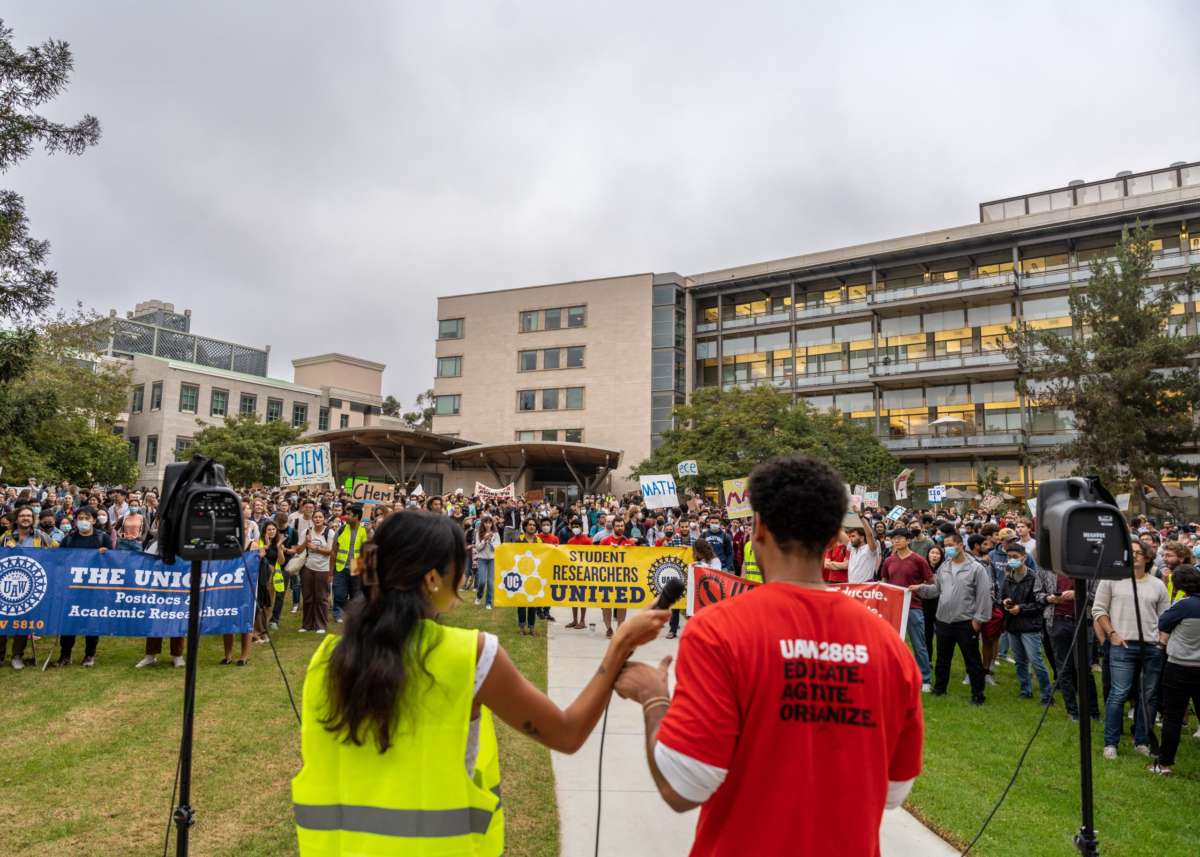Honest, paywall-free news is rare. Please support our boldly independent journalism with a donation of any size.
Approximately 48,000 academic workers across the University of California’s (UC) 10 campuses went on strike on Monday, marking the largest U.S. strike in 2022 and potentially the largest academic strike ever waged by higher education workers in the U.S.
Represented by several United Auto Workers (UAW) locals, graduate students, postdocs, teaching assistants, and other academic workers — altogether making up an indispensable but often overlooked workforce in academia — have walked off the job after authorizing a strike earlier this month with 98 percent of the vote among over 36,000 voting members.
The strike comes after negotiations between the unions and the university have broken down over months, particularly over pay. UC “left us no choice but to escalate,” one union leader said, as some academic workers have been stuck at the bargaining table for over a year.
Workers say they have been subject to years of financial abuse at the hands of the system, with some workers making $24,000 a year or less, according to union leaders. The workers are demanding a base pay of $54,000 a year for graduate workers and other provisions like improved child care benefits and free public transit passes.
This base wage would be slightly above a living wage for an individual with no children in California overall, though still less than a living wage in places like San Francisco, where one UC campus lies. As it is, the unions have found in a survey that 40 percent of graduate students spend more than half of their pay on rent, while 92 percent use more than 30 percent of their pay on rent; some workers report being forced to take on credit card debt just to survive.
The unions have accused UC of not bargaining in good faith and have filed dozens of unfair labor practice charges against the university, including for things like allegedly unilaterally changing transit benefits.
“We have been bargaining throughout the weekend and while important progress has been made, we are still far apart on many of the issues that will make UC a more equitable university: dignified compensation that addresses the crisis of affordable housing, access to transportation benefits so those who must commute can do so affordably and with a minimal carbon footprint,” and more, UAW 2865 President Rafael Jaime said in a statement. UAW 2865 represents 19,000 of the striking workers.
“We are hopeful that UC will cease its Unfair Labor Practices and bargain with us in good faith,” Jaime continued.
The unions have emphasized that they represent the backbone of the university — that, despite often low wages, the universities would not have the prestige or research output that they boast without the graduate student workers.
In negotiations, UC has countered with salary raises of 4 to 7 percent the first year — not enough to cover inflation increases, as of October — and 3 percent in subsequent years.
The university also contends that it provides campus housing below market value, though workers say that rent for campus housing can still amount to a significant chunk of worker pay; as UAW 2865 President Rafael Jaime told the Los Angeles Times, rent for a studio at UC Los Angeles is about $1,600 a month, or 80 percent of the average monthly pay of $2,000 for graduate students.
This is the second time in recent years that UC academic workers have expressed vast discontent with conditions; UC lecturers similarly contended that the university doesn’t sufficiently value them when lecturers voted to strike in late 2021. A strike of about 6,500 lecturers was narrowly averted as the workers won salary increases of about 30 percent over the next five years and pledges for better job security.
There were also a number of “wildcat” strikes at UC Santa Cruz and other UC campuses in recent years as graduate workers demanded better pay, ultimately winning compensation increases and the reinstatement of several dozen workers who were fired.
A terrifying moment. We appeal for your support.
In the last weeks, we have witnessed an authoritarian assault on communities in Minnesota and across the nation.
The need for truthful, grassroots reporting is urgent at this cataclysmic historical moment. Yet, Trump-aligned billionaires and other allies have taken over many legacy media outlets — the culmination of a decades-long campaign to place control of the narrative into the hands of the political right.
We refuse to let Trump’s blatant propaganda machine go unchecked. Untethered to corporate ownership or advertisers, Truthout remains fearless in our reporting and our determination to use journalism as a tool for justice.
But we need your help just to fund our basic expenses. Over 80 percent of Truthout’s funding comes from small individual donations from our community of readers, and over a third of our total budget is supported by recurring monthly donors.
Truthout’s fundraiser ended last night, and we fell just short of our goal. But your support still matters immensely. Whether you can make a small monthly donation or a larger one-time gift, Truthout only works with your help.
